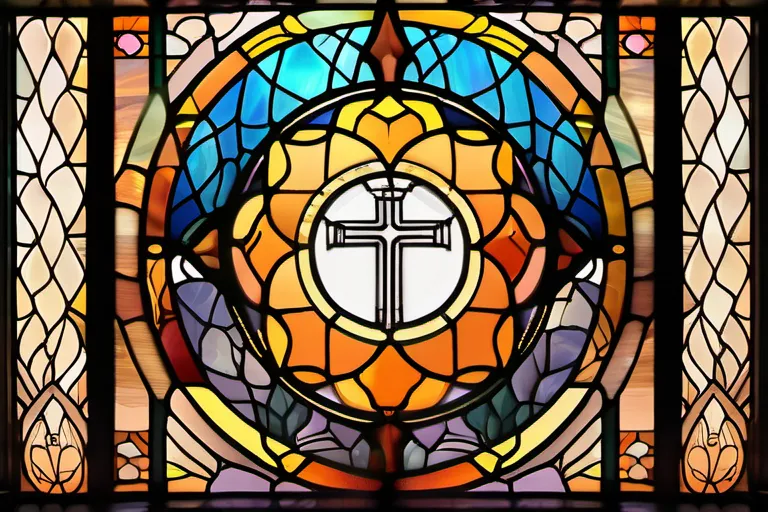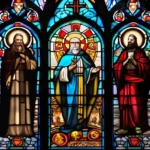Explore the history, beliefs, and practices of Unitarianism in this detailed article.
Unitarianism is a liberal Christian denomination that emphasizes the oneness of God. In this article, we will delve into the origins, core beliefs, and unique practices of Unitarianism, providing you with a comprehensive understanding of this fascinating faith.
The Origins of Unitarianism
Imagine tracing back through the centuries, like peeling away layers of history to uncover the origins of Unitarianism. Where did it all begin? Let’s start at the very roots, delving into ancient Christianity and how early Christian thinkers began to challenge traditional dogma.
Early Beginnings: In the 16th century, we find ourselves in the tumultuous world of Martin Luther and the Protestant Reformation. But before that, Unitarian ideas were already germinating. The term ‘Unitarian’ itself comes from the Latin word unitas, meaning unity or oneness. This concept was rooted deeply in the early Christian era, where some groups believed in a single divine being without any division.
A Key Figure: Fausto Socino: Fast forward to the 16th century and we meet fausto socini, a minister who dared to challenge the established doctrines of his time. His ideas spread widely, particularly in Poland and Transylvania, where he founded the Unitarian Church in Transylvania in 1568. Socino’s belief that God was one being, not three, resonated with many seeking a simpler form of faith.
Transylvanian Society: The Apostolic Protestant Church of Transylvania, established under Socino’s influence, became a beacon for those who questioned traditional church hierarchies and doctrines. It was here that the seeds of Unitarianism truly took root, with its emphasis on individual reason and direct connection to God.
Modern Resurgence: Fast forward again, to the 19th century when British intellectuals like Joseph Seaverns and William Ellery Channing picked up where Socino left off. They reintroduced Unitarian ideas in England and America, paving the way for the modern Unitarian movement. Today, Unitarian Universalism, as it’s known, continues this legacy of inclusivity and freedom of belief.
So, as we look back at these pivotal moments, one question remains: How did a simple idea about God’s oneness evolve into such a rich and diverse religious tradition? The journey of Unitarianism is a testament to the enduring quest for spiritual truth and the power of ideas to shape history.
Unitarian Beliefs: The Oneness of God
When we delve into the core beliefs of Unitarianism, one of the most distinctive and intriguing aspects is its belief in the oneness of God. How does this simple yet profound concept set Unitarians apart from traditional Christian denominations?
In many religious traditions, including some forms of Christianity, the belief in a Trinity—God as three persons in one being—is deeply ingrained. But for Unitarians, the idea is quite different. They emphasize the unity and singularity of God, seeing him not as a trinity but as a single entity.
Imagine a river flowing through time; for traditional Christians, this river branches out into three streams: Father, Son, and Holy Spirit. For Unitarians, it’s more like a single, continuous flow that weaves together to form one divine essence. This belief isn’t about splitting God but seeing him as an indivisible unity.
So why does this matter? It matters because it changes the way we understand God’s role in our lives and in the world. For Unitarians, it’s not just about believing in three aspects of a single being; it’s about recognizing that God is present in all of creation, working through nature and human potential.
This belief also influences how Unitarians approach religious practices and teachings. Rather than focusing on doctrinal differences, they emphasize personal spiritual growth and ethical living as ways to connect with the divine presence in their lives. It’s a belief system that encourages individuals to seek out their own understanding of God’s nature through introspection and experience.
But how does one fully grasp such a complex and abstract concept? Perhaps it’s best understood not by defining it, but by feeling its impact. How would your life change if you approached the divine as a single entity, rather than three distinct persons?
Reflecting on this belief in the oneness of God can be both challenging and transformative. It invites us to question our deepest assumptions about divinity and open ourselves to new ways of understanding the spiritual realm.
The Development of Unitarian Theology
The development of Unitarian theology has been a journey marked by pivotal moments and influential figures, much like a river that carves its path through time. As we delve into this history, we must ask ourselves: How did Unitarianism evolve from its roots to become a distinctive religious movement?
One of the earliest voices in this evolution was The Unitarian, a magazine established in 1794 that became a platform for theological discussions. This publication played a crucial role, serving as a beacon for those who sought to question traditional Christian dogmas and embrace a more rational approach to faith.
Key thinkers such as Joseph Priestley were instrumental in shaping early Unitarian theology. Priestley’s writings challenged the concept of the Trinity, advocating instead for a single, unified Godhead. His ideas were radical at the time but laid the groundwork for what would become known as Unitarianism.
The development of Unitarian theology was not just intellectual; it was also driven by social and political changes. The Enlightenment period provided a fertile ground for questioning established norms, and Unitarians like Priestley were part of this broader movement towards reason and individual liberty.
Another significant figure is Margaret Fell, who played a pivotal role in the establishment of the Religious Society of Friends (Quakers). Her writings and teachings emphasized the importance of spiritual experience and personal conscience, influencing Unitarian thought with their emphasis on inner light and direct revelation from God.
As we trace the path of Unitarian theology, we encounter key movements such as Transcendentalism, which flourished in New England during the 19th century. Figures like Ralph Waldo Emerson and Henry David Thoreau were not only literary giants but also influential Unitarians who championed ideas of individual freedom and spiritual exploration.
The evolution of Unitarian theology into a distinct movement was further propelled by the writings of James Martineau. His work, particularly ‘The Search after Truth,’ explored the nature of religious experience in a way that resonated with many seeking a more personal approach to faith. Martineau’s ideas helped solidify Unitarianism as a theology that emphasized reason and individual conscience.
Throughout its development, Unitarianism has continually sought to refine and expand its theological boundaries. It embraced progressive views on issues like gender equality, pacifism, and social justice early on, reflecting the movement’s commitment to ethical living and reasoned faith.
In conclusion, the journey of Unitarian theology is a testament to the power of questioning, rational thought, and individual experience in shaping religious belief. As we look at its development, it becomes clear that Unitarianism has always been about more than just beliefs; it’s about a way of living that respects personal freedom and promotes ethical responsibility.
Unitarian Practices: A Focus on Reason and Community
As we explore the practices of Unitarianism, it’s important to understand how these traditions shape and define the religion today. One key practice that sets Unitarians apart is their emphasis on reason. For many, this means a deep respect for rational thought and evidence-based beliefs, rather than dogmatic adherence to traditional doctrines. How often do we stop to question what we believe? Are our beliefs based solely on faith or have we considered the reasoning behind them?
The focus on reason in Unitarianism is reflected in their approach to worship and community life. Services often include discussions where members engage in dialogues, sharing personal insights and challenging each other’s views. This creates a dynamic environment that encourages growth and mutual understanding, much like a garden where diverse plants coexist and support each other’s growth.
A key aspect of Unitarian practices is their commitment to community. Unlike some traditional churches, Unitarians see the congregation as more than just a collection of individuals; it’s a collective that works towards common goals. This sense of community extends beyond the church walls into broader social issues. Unitarians are often found at the forefront of social justice movements, advocating for equality and human rights. By engaging in community service and activism, they embody their belief that religion should make a positive impact on society.
The connection between reason and community in Unitarianism is like a bridge: it unites individuals through shared inquiry and common purpose. This approach not only enriches the spiritual lives of its members but also fosters a sense of belonging and responsibility to the wider world. As we continue our journey into exploring how this religion shapes the contemporary landscape, these practices will play an integral role in understanding Unitarianism’s unique identity.
Unitarianism Today: A Global Movement
Unitarianism today: A global movement, indeed it’s fascinating to explore how this faith has spread its wings across continents and cultures. From North America to Europe and beyond, Unitarian Universalists (UU) can be found nurturing their beliefs in diverse communities. Have you ever wondered how a religion with such deep historical roots manages to resonate so widely today?
Let’s take a look at Unitarianism as it exists globally. In the United States, Unitarian Universalist churches are often vibrant centers of social activism and community service. They play a crucial role in addressing issues like climate change, poverty, and human rights, reflecting their commitment to social justice. But did you know that this movement has also found strongholds in countries like Canada, where it continues to shape public discourse on ethics and morality?
In Europe, particularly in the United Kingdom, Unitarianism is deeply intertwined with secular humanist movements. Here, UU congregations often engage in dialogue with other faith communities, promoting mutual respect and understanding. It’s almost as if these churches are serving as bridges between different belief systems, fostering a sense of unity amidst diversity.
And then there’s the global reach: Unitarian Universalism is practiced in India, Africa, and South America, where it often serves as a voice for marginalized communities. These local branches of the faith adapt their practices to suit the cultural contexts while maintaining core values such as reason and compassion.
The diversity within Unitarianism today highlights its adaptability and relevance. It’s like a tree with roots deeply embedded in history but branches that reach out to embrace new worlds, always seeking to grow and evolve. This global presence not only strengthens the faith itself but also enriches the tapestry of world religions.
As we delve deeper into Unitarianism today, it becomes clear that its global movement is more than just a collection of churches; it’s a vibrant network of individuals committed to making a difference in their communities. This universal appeal and active engagement make Unitarian Universalism a compelling force for positive change wherever it exists.
Engaging with Unitarianism: Resources for Further Study
Engaging with Unitarianism can be a profound and enriching journey, much like exploring a vast garden filled with diverse flowers. To truly understand this unique spiritual movement, it’s essential to delve into its rich history, core beliefs, and current practices. However, what better way is there to explore than through the tools and resources provided by those who have already trodden these paths?
Firstly, for a deep dive into the historical roots of Unitarianism, consider ‘The Unitarians: A History from the Reformation to the Present Day’ by James G. Crossley. This book is like a well-worn map guiding you through the complex terrain of its development, highlighting key figures and pivotal moments that shaped this movement.
Next, The Unitarian Universalist Association (UUA) offers a treasure trove of resources for both newcomers and seasoned enthusiasts. Their website is filled with articles, podcasts, and videos that explore the breadth of Unitarianism’s beliefs and practices. Engaging with these materials can be likened to tasting various flavors from a global feast, each offering unique insights and perspectives.
For those interested in delving deeper into contemporary issues through a Unitarian lens, the ‘Unitarian Universalist World Community’ publication is an invaluable resource. This magazine connects you with real-world applications of Unitarian principles, much like seeing the direct impact of a river on the landscape it nourishes.
Lastly, participating in local Unitarian or Unitarian Universalist communities can provide a rich, lived experience. These communities offer opportunities for dialogue and mutual support, akin to finding a warm hearth after a long journey. Engaging with fellow believers through study groups, workshops, or community service projects can help solidify your understanding and deepen your spiritual connection.
By leveraging these resources, you’ll not only enrich your knowledge but also become an active participant in this ongoing, vibrant tradition of Unitarianism. As you explore, remember that each step is a journey towards greater understanding and connection—much like the act of planting seeds to see them grow into something beautiful.
Conclusion
 By the end of this article, you will have gained valuable insights into the history, beliefs, and practices of Unitarianism. You will also be equipped to engage in meaningful discussions about this important religious movement.
By the end of this article, you will have gained valuable insights into the history, beliefs, and practices of Unitarianism. You will also be equipped to engage in meaningful discussions about this important religious movement.











